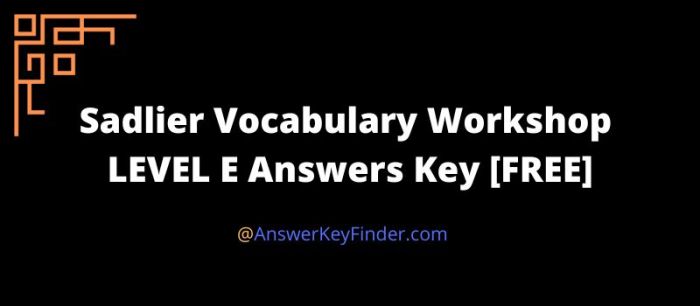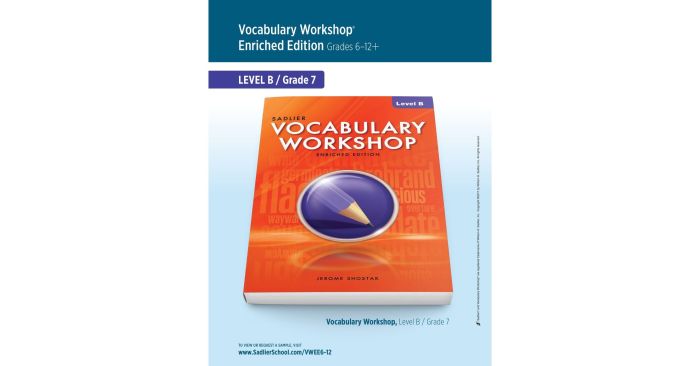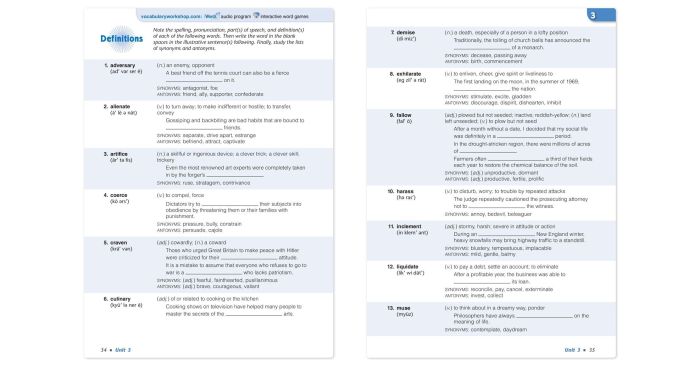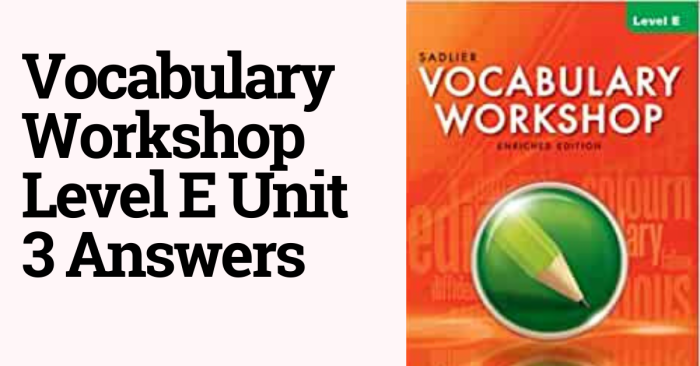Embark on an enriching linguistic journey with Vocabulary Workshop Level E Unit 13, meticulously crafted to expand your vocabulary and elevate your communication skills. This comprehensive workshop delves into the intricacies of word origins, contextual usage, and interactive activities, empowering you to master a diverse range of vocabulary.
Through engaging explorations of root words, prefixes, and suffixes, you will unlock the secrets of unfamiliar words, unlocking their meanings and enhancing your word recognition. Contextualization exercises will immerse you in real-world scenarios, demonstrating the nuances of word usage and the importance of understanding context.
Vocabulary Workshop Level E Unit 13

Vocabulary expansion is crucial for effective communication. This article provides a comprehensive overview of vocabulary development, covering key aspects such as word study, contextualization, word mapping, interactive activities, and assessment.
1. Vocabulary Expansion
- Acquire:To obtain or come into possession of something.
- Allocate:To distribute or assign resources, such as time or money.
- Appraise:To assess the value or worth of something.
- Articulate:To express oneself clearly and effectively.
- Assimilate:To absorb or integrate new information or ideas.
- Concise:Brief and to the point.
- Concur:To agree with someone or something.
- Consolidate:To combine or merge things into a single unit.
- Cultivate:To develop or improve something over time.
- Devise:To create or invent something.
2. Word Study, Vocabulary workshop level e unit 13
Word study involves analyzing the root words, prefixes, and suffixes of words. This helps determine their meaning and how they relate to other words. For example, the root word “dict” means “to say.” The prefix “con” means “with” or “together.”
Therefore, the word “contradict” means “to say against” or “to disagree.”
3. Contextualization
Understanding the context in which words are used is essential for comprehending their meaning. For example, the word “run” can have different meanings depending on the context. It can mean “to move quickly on foot,” “to operate,” or “to be in charge of something.”
4. Word Mapping
Word mapping is a visual representation of the relationships between words. It can be used to enhance vocabulary retention and comprehension. For example, a word map could connect the words “acquire,” “assimilate,” and “consolidate” based on their shared meaning of “to gain or incorporate.”
5. Interactive Activities
Interactive activities, such as games and quizzes, can reinforce vocabulary learning. These activities provide opportunities for students to practice using the words in different contexts and to test their understanding.
6. Assessment
Assessing vocabulary knowledge is important for tracking progress and identifying areas for improvement. Assessments can include multiple-choice quizzes, short answer questions, or writing assignments that require students to use the vocabulary words correctly.
FAQ Insights: Vocabulary Workshop Level E Unit 13
What is the purpose of Vocabulary Workshop Level E Unit 13?
Vocabulary Workshop Level E Unit 13 aims to enhance your vocabulary, improve your understanding of word origins and usage, and develop effective communication skills.
How does the workshop approach vocabulary building?
The workshop employs a multifaceted approach, including vocabulary expansion, word study, contextualization, word mapping, interactive activities, and assessment, to foster a deep understanding of vocabulary.
What are the benefits of completing Vocabulary Workshop Level E Unit 13?
Upon completing the workshop, you will have expanded your vocabulary, improved your word recognition and comprehension, and developed strategies for effective vocabulary retention.


